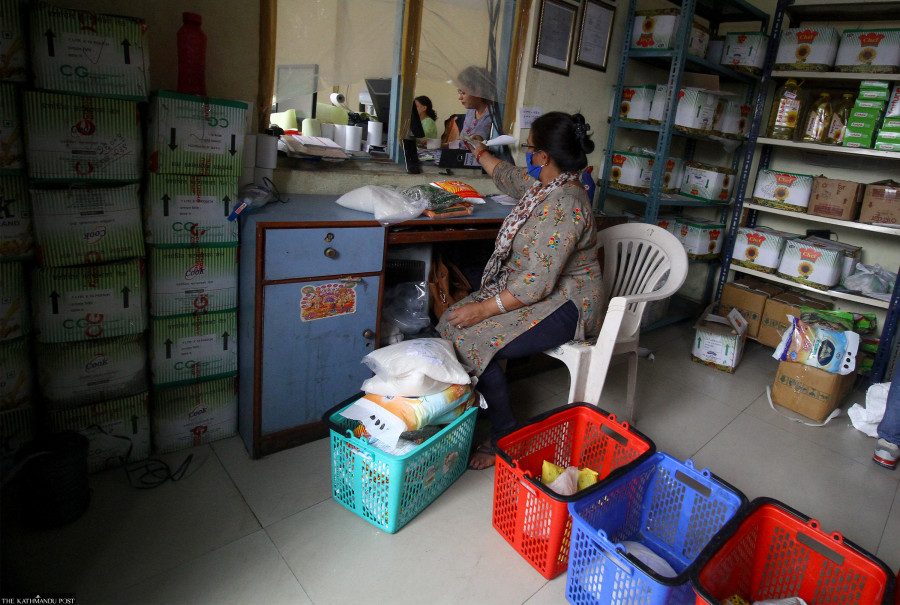Money
Government subsidised stores open across country
The scheme will not help to control prices, nor will it benefit the targeted groups, activists say.
Krishana Prasain
Government subsidised stores opened at different outlets of Food Management and Trading Company and Salt Trading Company on Friday.
The stores selling daily essential goods at subsidised prices will serve customers through the festival season till November 10.
Consumer rights activists have viewed the initiative with scepticism, saying that selling a limited number of products from a few outlets of state-owned companies will not make a huge impact on the market.
The scheme will not help to control prices, nor will it benefit the targeted groups and provide relief to consumers, they said.
Food Management and Trading is providing a discount of Rs5 per kg on all types of rice, wheat, lentils, beaten rice and flour. Mustard and sunflower oils are being sold at a discount of Rs5 per litre and soybean oil at a discount of Rs10 per litre. Karnali beans and buckwheat are cheaper by Rs10 per kg. Live goats are available at a discount of Rs10 per kg.
Food Management and Trading Company maintains 43 outlets in 39 districts.
“The maximum quantity allowed per customer and prices can be fixed depending on the inventory and consumer pressure by conducting internal discussions and creating a work procedure,” said the company. Separate sales quotas have been set for urban and rural areas depending on the food situation.
The company is bringing around 2,000 goats from Hetauda and Dang. It is unlikely that Himalayan goats will be brought this Dashain due to the high prices and the difficulty of importing them from China, officials said.
Mohan Prakash Chand, chief executive officer of Food Management and Trading Company, said that farmers in Mustang were selling Himalayan goats at prices ranging from Rs30,000 to Rs40,000 and even higher per head. “We cannot buy goats at those prices and sell them to consumers,” he said.
Salt Trading Company will be selling subsidised food items such as rice, legumes and lentils, spices, edible oil, sugar and salt from its 42 outlets across the country.
Dairy products like milk, paneer and ghee produced by Dairy Development Corporation will be sold at a discount from these subsidised shops.
Consumer rights activists said that the subsidised shops the government has opened targeting low-income consumers and rural people never benefit from them.
"Unless subsidised shops are opened in all 753 local units in the country, the targeted groups will never be able to benefit from the discounts provided by the government," said Madhav Timilsina, president of the Consumer Rights Investigation Forum.
"Besides, selling a limited number of goods will have no effect on market prices which the government intends to stabilise by opening these subsidised shops," he said, adding that the subsidised goods should be delivered to different places by truck if the targeted people are to benefit.
“When edible oil prices have jumped by more than 17 percent, the cost of sugar has reached Rs100 per kg, legumes and lentils have become dearer by 10 percent, and almost all food items have become costlier, offering small discounts will not help low-income consumers, marginalised groups and people who have lost their jobs and income sources due to the pandemic,” he said.
"Even people residing outside the Ring Road in Kathmandu cannot benefit from the government subsidised shops because they have to spend more on travel than they save with the discount," he said.
Some consumers have complained about the quality of the food items sold at the subsidised shops in the past.
Pabitra Gurung, a resident of Thankot who purchased Karnali beans from a subsidised shop last Dashain, said the beans were of poor quality and did not cook well.
“I had bought 2 kg of beans at Rs200 which I had to throw away because they did not cook well,” said the 48-year-old housewife.
Timilsina said consumers had complained in past years about the food items bought from subsidised shops which were of low quality.
Consumers have also complained in the past that the food items sold at the government subsidised shops could be bought in the market for less.
With the increase in consumption during festival time, the Ministry of Industry, Commerce and Supply has also decided to make an intense and joint inspection of prices, quality and quantity of goods in the market.
Sales of food and non-food items like clothes and electronics double during major festival seasons, and the rise in consumer spending raises chances of business fraud.
The Department of Commerce, Supplies and Consumer Protection will be holding discussions with private sector organisations like the Federation of Nepalese Chambers of Commerce and Industry and Confederation of Nepalese Industries and department stores about operating subsidised shops as they have spread to different parts of the valley.




 8.88°C Kathmandu
8.88°C Kathmandu














